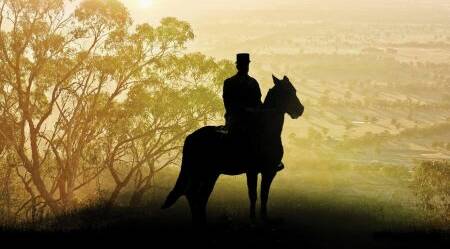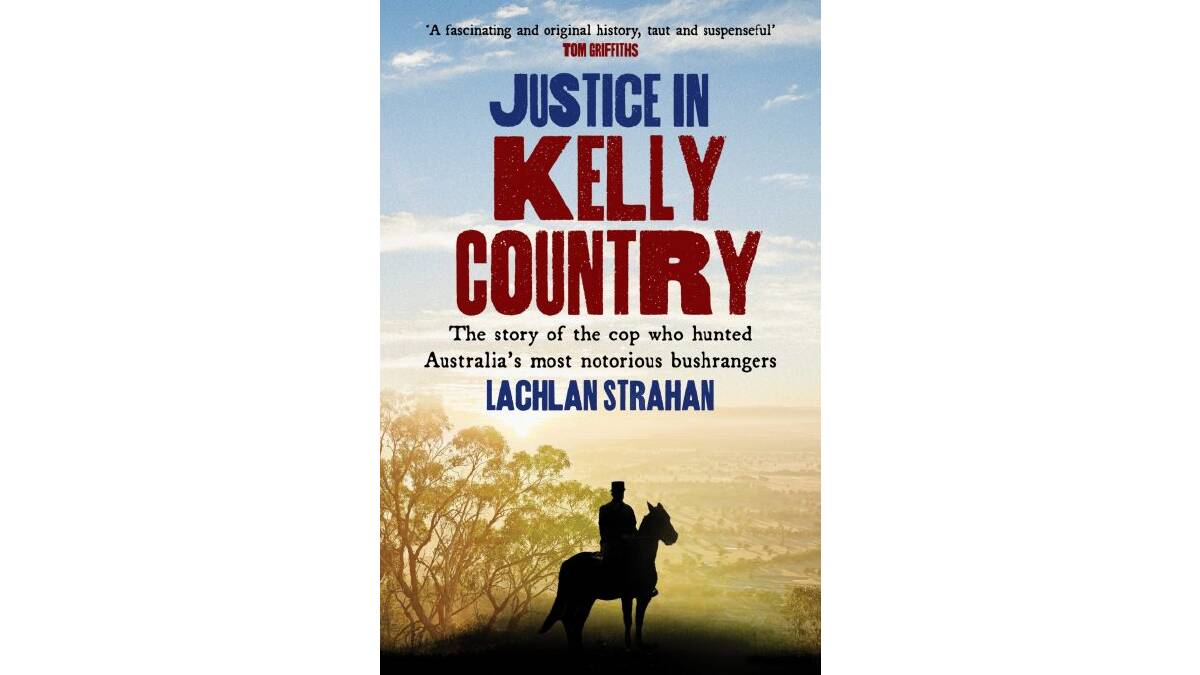
- Justice in Kelly Country, by Lachlan Strahan. Monash University Press, $32.99.
Shortly after coining a wonderfully droll, three-word epitaph, Ned Kelly was hanged almost 143 years ago. Nonetheless, the bushranger remains pure literary catnip; adding the name, Kelly, to any title seems to guarantee a wide, curious and loyal readership.
Subscribe now for unlimited access.
or signup to continue reading
Kelly has inspired two excellent novels, Robert Drewe's Our Sunshine (1991) and Peter Carey's The True History of the Kelly Gang (2000). We no longer have to rely on Mick Jagger's pouty, casually ironic interpretation of Kelly (from 1970). Carey's version especially is a remarkably intense, passionate feat of empathy.
Justice in Kelly Country might possibly have turned that fiction duet into a trio. Strahan does invent the setting and dialogue of one scene, an armed confrontation between bushrangers and police officers which could easily have ended in murder. He does that deftly and dramatically. Other segments of the narrative could have been expanded and embroidered if treated as a novel rather than a work of history.
Lachlan Strahan is, however, a gifted historian, author of a valuable account of Australian attitudes towards China, and recently returned from a stint as Australia's High Commissioner in Honiara.

In this book, he exhumes an ancestor, his great-great-grandfather, a man bitterly hostile to the Kelly gang who doggedly pursued Ned through North East Victoria.
Put as bluntly as possible, the key question about Anthony Strahan the police officer is whether he formed part of an over-armed, under-trained, plain clothed hit squad, one determined to persecute all Kellys, then to murder Ned and his mates out of hand. Ned himself harboured no doubts; he was convinced that Strahan was resolved to shoot him like a dog. To be fair, Ned is alleged to have expressed a wish to roast Strahan alive.
Strahan readily concedes that the written record on Senior Constable Strahan remains "patchy and patterned with silences, gaps, misperceptions, bias and outright lies". Just as frankly, Strahan focuses on the policeman's reputation as driven and restless, too fond of quarrels and abusive language, not often able to constrain his dirty temper. As Strahan acknowledges, Australian history has "mostly" depicted the constable as "a trouble-making villain".
That said, Strahan takes pains to underline the constable's diligence, resilience and sense of duty. The reader is invited to follow his career not just in tracking the Kellys but in treating snake bite, closing down a sly grog shanty, catching a crooked squatter, collaring a would-be highway robber, arresting a villain who had burned down the family home, and - this is a Victorian narrative, after all - defending a woman's honour.
In the absence of much personal, private writing from Constable Strahan himself, the writer Strahan applies himself indefatigably to trawling through all manner of public records. His copious reading is worn lightly. His explanations of family genealogy and prejudices genuinely fit within Strahan's broader commentary on emigration from Ireland, suspicions between Catholics and Protestants, development of the Victorian economy and a considered judgement on the quality of policing. Lachlan Strahan is also talented at evoking the smells and sounds, the pace and personalities, of country Victoria, even of a hamlet like Wooragee which the average reader would never even have driven past.
With that work on context, setting and back-stories, a reader is more than half-way through the book before the constable encounters the Kelly gang. Lachlan Strahan then seeks to explain how "a chain reaction of events, with its own logic and momentum, pushed all the players along". Whether justice was actually done, as the title suggests, remains a contested, complicated issue.
Returning to that threshold question, whether the constable was bent on harassing and hunting down the Kellys, Strahan proposes a much more judicious, layered approach - but one which does not amount to either apologia or hagiography. He certainly does not regard the Victorian police of the time as thuggish, drunken, trigger-happy bullies.
At Stringybark Creek, when the Kellys killed three policemen, Senior Constable Strahan was elsewhere, plodding stoically through the bush a short distance to the north. Along with his colleagues, Strahan guarded the wrong part of the border while the Kelly gang went on a spree in Jerilderie. At Glenrowan, the Kelly's Valhalla, Constable Strahan was a few towns away as well. His most direct interventions with the Kelly gang were one argument and his assistance at the arrest of Kelly's mother, first poorly treated in Beechworth gaol, then sentenced to an absurdly long term in prison.
Constable Strahan's application to "a hard job in hard times" brought him relatively few rewards. He was neither promoted nor rewarded for his engagement with the Kellys. The senior constable may now, though, have had his reputation redeemed.














